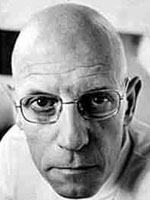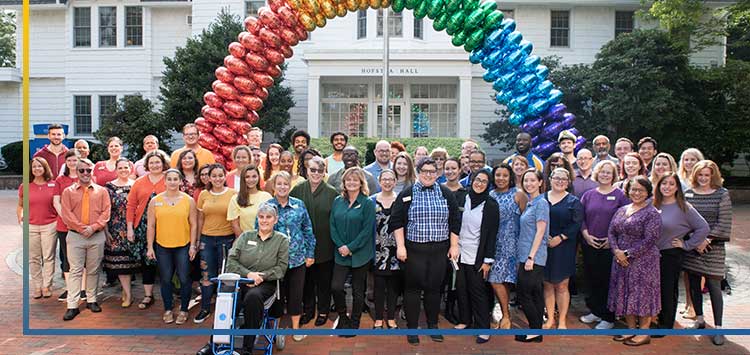LGBTQ+ Symposium
March 27-28, 2014
“Michel Foucault 2014: Beyond Sexuality”
Michel Foucault (1926-1984) – Philosopher, social theorist, historian of ideas.
- Folie et déraison: Histoire de la folie à l'âge classique (1961)
- Naissance de la clinique: une archéologie du regard médical (1963)
- Death and the Labyrinth: The World of Raymond Roussel (1963) [French title: Raymond Roussel]
- Une archéologie des sciences humaines (1966)
- The Archaeology of Knowledge (1969)
- Surveiller et punir: Naissance de la prison (1975)
- Three volumes of The History of Sexuality
- 1: La volonté de savoir (1976)
- Histoire de la sexualité, II: l'usage des plaisirs (1984)
- Histoire de la sexualité, III: le souci de soi (1984)

One of the foremost and most widely read French philosophers of the 20th century,1 Michel Foucault is known especially for his (in)famous History of Sexuality. The three volumes of this monumental and somewhat contested magnum opus were published in 1984. Also in 1984, Foucault died of complications related to AIDS. In June of this year [i.e., 2014, the year of the proposed conference], the 30th anniversary of his death but especially the 30th anniversary of his most influential publication offers us a significant opportunity to revisit Foucault’s work, his influence, his legacy, and the future, if any, of Foucauldian studies.
The social sciences and the humanities and some of the hard sciences have all been, in one way or another, influenced by Foucault’s publications. The presence of his thinking and writing naturally inhabits the work of many scholars in Sexology, Psychology, Sociology, Queer Studies, and the History of Ideas. However, evidence of his importance is also current in Literature, Criminology, Performance Studies, and Science Studies. It is incumbent on us at Hofstra University to take the opportunity of this important 30th anniversary to bring together scholars of many disciplines to discuss where Foucault’s thought is leading us today and might lead us tomorrow.
With the strength of LGBTQ+ Studies at Hofstra and the recent establishment of the LGBTQ+ Center, Hofstra University stands to make a significant contribution to queer studies. A 3-day conference of this consequence will cement Hofstra’s reputation as a significant center for LGBTQ+ studies and scholarly production. This will be the most important of the LGBTQ+ symposia so far in terms of breadth of disciplines potentially involved and scope of influence and scholarly production.
We propose inviting Dr. Arnold Davidson (University of Chicago), one of the foremost, international scholars on the works of Michel Foucault. Dr. Davidson is the Series Editor of the English translations of Foucault lectures that are in process of being published for the first time and which are significantly re-shaping how scholars understand Foucault’s work and legacy. His 2005 publication, The Emergence of Sexuality, has already become one of the mainstays of queer bibliographies; his works are cited amongst the most eminent scholars; he is regularly invited to teach in Paris and in Florence – his presence at the symposium would assure a very significant turnout in terms of submissions of papers and attendance.
In addition to Dr. Davidson, we would like to also invite Dr. Judith Butler (Columbia University), distinguished American philosopher and author of several important books on queer theory, construction of sex and gender, and related ideas; she is also one of the most often cited authors in articles in queer studies.
Below is a list of the conference topics we will propose in the CFP, to which naturally other suggestions would be considered.
- Crisis in the academy -- Foucault elaborated his notion of the ‘specific intellectual’ in response to a crisis in the University in his day: What is the role of intellectuals today amid an academy arguably in crisis?
- The turn towards Greco-Roman classics -- What was his “Greco-Roman journey” about? What has come of it – in classics, philosophy, cultural studies?
- Beyond Sexuality? Post-queer? Identity -- subjectivity – an ethics of de-subjectivation: what frameworks seem most promising for thinking sexual practices now?
- Medicine as a way that we are governed. History of medicine, biopolitics, future of medicine
- Telling truths and telling stories: What is the role of art and literature, new media and an aesthetics of existence in a politics of the future?
- Roundtable discussion of “Le Gai Savoir” – Open discussion ofan interview that Foucault did with Jean Le Bitoux in 1978 (translation distributed in advance).
Conference Directors:
Ann Burlein
Steven D. Smith
(David A. Powell, consultant and cheerleader)



